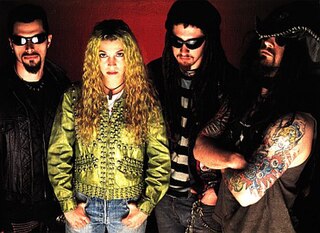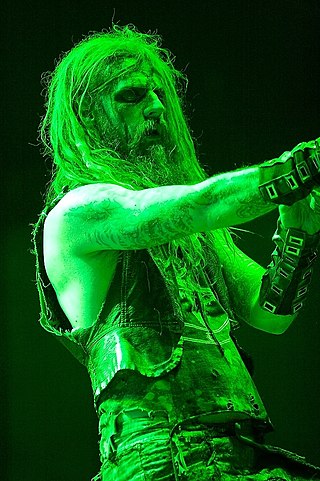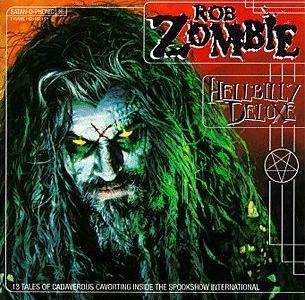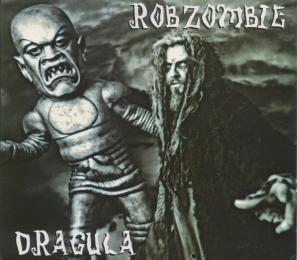Related Research Articles

White Zombie was an American heavy metal band that formed in 1985. Based in New York City, they started as a noise rock band, releasing three EPs and one studio album in that style before changing to a heavy metal-oriented sound that broke them into the mainstream. The albums La Sexorcisto: Devil Music Volume One (1992) and Astro-Creep: 2000 (1995) established them as an influential act in groove metal and industrial metal, respectively. Their best-known songs include "Thunder Kiss '65", "Black Sunshine" and "More Human than Human". The group officially disbanded in 1998. In 2000, White Zombie was included on VH1's 100 Greatest Artists of Hard Rock, ranking at No. 56. As of October 2010, the band has sold six million albums, according to Nielsen SoundScan.

Astro-Creep: 2000 – Songs of Love, Destruction and Other Synthetic Delusions of the Electric Head is the fourth and final studio album by American heavy metal band White Zombie, released on April 11, 1995, by Geffen Records. The album proved to be their most commercially successful recording, peaking at number six on the Billboard 200 with the aid of the popular hit singles "More Human than Human" and "Super-Charger Heaven". It was the band's only studio album to feature John Tempesta on drums.

Rob Zombie is an American singer, songwriter, record producer, filmmaker, and actor. His music and lyrics are notable for their horror and sci-fi themes, and his live shows have been praised for their elaborate shock rock theatricality. He has sold an estimated 15 million albums worldwide.

"Zombie" is a protest song by Irish alternative rock band The Cranberries, written by the band's lead singer, Dolores O'Riordan, in response to and in memory of two young victims of a bombing in Warrington, England, that occurred during the Troubles in Northern Ireland. The song was released on 19 September 1994 by Island Records as the lead single from their second studio album, No Need to Argue (1994), two weeks ahead of the album's release. Music critics have long recognized "Zombie" as "a masterpiece of alternative rock", as well as a grunge number uncharacteristic of the band's other work given its sound based around distorted guitars and shouted vocals.

"Layla" is a song written by Eric Clapton and Jim Gordon, originally recorded with their band Derek and the Dominos, as the thirteenth track from their only studio album, Layla and Other Assorted Love Songs (1970). Its contrasting movements were composed separately by Clapton and Gordon. The piano part has also been controversially credited to Rita Coolidge, Gordon's girlfriend at the time.

The Bridge is the tenth studio album by American singer-songwriter Billy Joel, released on July 25, 1986. It was Joel's last studio album produced by Phil Ramone as well as the last to feature Joel's long-time bassist Doug Stegmeyer and rhythm guitarist Russell Javors. The album yielded several successful singles, including "A Matter of Trust", "Modern Woman", and "This Is the Time".

Songs in the Attic is the first live album by Billy Joel, released in 1981.

Phantom Planet is the third album by the rock band Phantom Planet, released on January 6, 2004. The album marked a change in the band's sound, shifting from radio-friendly pop rock to garage rock, comparable to the sound of the Strokes. Produced by Dave Fridmann, it is their first album to feature drummer Jeff Conrad.

Charles Alexander Clouser is an American keyboardist, composer, record producer, and remixer. He worked with Trent Reznor for Nine Inch Nails from 1994 to 2000, and is a composer for film and television; among his credits are the score for the Saw franchise and American Horror Story. Clouser was nominated for two Grammy Awards for Best Metal Performance in 1997.

Hellbilly Deluxe: 13 Tales of Cadaverous Cavorting Inside the Spookshow International is the debut solo studio album by American musician and filmmaker Rob Zombie. The album serves as his first release outside of the band White Zombie, with whom he released two multi-platinum studio albums. Hellbilly Deluxe was released on August 25, 1998, through Geffen Records. Musically, the project portrays Zombie's love for classic horror films with heavy metal and electronic music. The album's lyrics speak of murder, chaos, and supernatural forces. The majority of Hellbilly Deluxe was recorded in California, and was produced by both Zombie and Scott Humphrey; Zombie is credited as the sole writer on all of the songs.
"Do You Want to Know a Secret" is a song by English rock band the Beatles from their 1963 album Please Please Me, sung by George Harrison. In the United States, it was the first top ten song to feature Harrison as a lead singer, reaching No. 2 on the Billboard chart in 1964 as a single released by Vee-Jay, VJ 587. In the UK, Billy J. Kramer released a cover of the song as his debut single, reaching No. 1 on the NME singles chart and No. 2 on the Record Retailer chart.

Blaze of Glory is the debut solo studio album by Jon Bon Jovi, the frontman of Bon Jovi. The album was released on August 7, 1990, through Mercury Records. It includes songs from and inspired by the movie Young Guns II. Emilio Estevez originally requested Bon Jovi's "Wanted Dead or Alive" as the theme song for his upcoming Billy the Kid sequel, but Jon Bon Jovi ended up composing an all-new theme song for the film's soundtrack instead.

"Dragula" is a debut solo single co-written and recorded by American rock musician Rob Zombie. It was released in August 1998 as the lead single from his solo debut Hellbilly Deluxe. Since its release it has become Zombie's most recognizable song as a solo artist. It is also his best-selling song, and had sold over 717,000 copies in the U.S. by 2010. The song is based on the drag racer "DRAG-U-LA" from the sitcom The Munsters.
The discography of American vocalist, film director, screenwriter, and film producer Rob Zombie consists of seven studio albums, three compilation albums, two remix albums, two live albums, one video album, 23 singles, and eight promotional singles. Zombie first rose to fame as a member of the heavy metal band White Zombie, with whom he released four studio albums; the group disbanded in 1998. Opting to continue making music as a solo artist, Zombie began working on his debut solo studio album that would come to be known as Hellbilly Deluxe: 13 Tales of Cadaverous Cavorting Inside the Spookshow International (1998). The project became a commercial success for Zombie, entering the top five of the Billboard 200 in the United States and selling over three million copies in the United States alone. The album spawned three singles, all of which were used extensively in films and video games following their release. Zombie released remixed versions of songs from his debut studio album on American Made Music to Strip By (1999), which peaked inside the top forty in the United States.

Zombie Strippers is a 2008 American zombie comedy film shot, edited, written, and directed by Jay Lee. The film, starring Robert Englund, Jenna Jameson, Penny Drake, and Roxy Saint, was distributed by Sony Pictures Home Entertainment.

"Everyday" is a song written by Buddy Holly and Norman Petty, recorded by Buddy Holly and the Crickets on May 29, 1957, and released on September 20, 1957, as the B-side of "Peggy Sue". The single went to number three on the Billboard Hot 100 chart in 1957. "Everyday" is ranked number 238 on Rolling Stone magazine's list of the "500 Greatest Songs of All Time".

"Until the Night" is a song written by Billy Joel for his 1978 album, 52nd Street. Although passed over for single release in the US, "Until the Night" was issued as the second single from 52nd Street in the UK - following "My Life" - in March 1979 and reached #50 on the UK Singles Chart.

William Michael Albert Broad, known professionally as Billy Idol, is an English-American singer, songwriter, musician and actor. He first achieved fame in the 1970s emerging from the London punk rock scene as the lead singer of the group Generation X. Subsequently, he embarked on a solo career which led to international recognition and made Idol a lead artist during the MTV-driven "Second British Invasion" in the US. The name "Billy Idol" was inspired by a schoolteacher's description of him as "idle".

"Cowboys and Angels" is a debut song recorded by American country music artist Dustin Lynch. It was released in January 2012 as the first single from his self-titled debut album. Lynch co-wrote the song with Josh Leo and Tim Nichols.

"Speed" is a song by British singer-songwriter Billy Idol, originally included in the soundtrack of the eponymous film. It was written by himself and by guitarist Steve Stevens, and released in August 1994 as the film's main song through Arista Records worldwide and Chrysalis Records in the United States.
References
- 1 2 3 Zimmer, Dave. "Acoustic Axman So Cal Guitarist Of the Year", BAM, 19 May 1989, p. 8.
- 1 2 3 Rotondi, James. "Youth Quake: 10 Trailblaizers Who Will Change the Way You Play." Guitar Player June 1994, p. 53.
- ↑ "The Best Of Denver 1987." Westword 1–7 July 1987, p. 74.
- ↑ Kirby, David. "White Acre Heads For Los Angeles". Colorado Daily, 3–6 June 1988, p. 16.
- ↑ "Newsmakers." Billboard, 10 November 1990, p. 105.
- ↑ Rotondi, James. "Youth Quake: 10 Trailblaizers Who Will Change the Way You Play." Guitar Player June 1994, p. 55.
- ↑ Music Connection 28 February 1994, p. 17.
- ↑ Allen, Marc. "Unique Twists Mark Bern Lyrics".
- ↑ "Billboard Song Contest: Salutes Its 5th Annual Winners." Billboard 30 July 1994, p. 16.
- ↑ Kramer, Pat. "Signing Stories." Music Connection 16 September 1996, p. 32.
- ↑ Messana, Sandi Salina. "Bill White Acre Finds His Inner Child". BAM, 15 November 1995.
- ↑ "Josh Canova Biography". Sweetslyrics. Archived from the original on 2012-03-11. Retrieved 2012-03-15.
- ↑ "Mr. Downstairs". Facebook. Retrieved 2012-03-15.